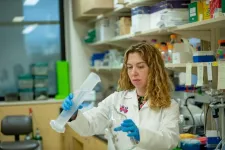(Press-News.org) Type 1 diabetes is an autoimmune disease that causes the body's immune system to attack and destroy insulin-producing beta cells in the pancreas. Traditional management of type 1 diabetes has primarily involved replacing the missing insulin with injections which, though effective, can be expensive and burdensome. A new study led by researchers at the University of Chicago Medicine and Indiana University suggests that an existing drug could be repurposed to treat type 1 diabetes, potentially reducing dependence on insulin as the sole treatment.
The research centers on a medication known as α-difluoromethylornithine (DFMO), which inhibits an enzyme that plays a key role in cellular metabolism. The latest translational results are a culmination of years of research: In 2010, while corresponding author Raghu Mirmira, MD, PhD, was at Indiana University, he and his lab performed fundamental biochemistry experiments on beta cells in culture. They found that suppressing the metabolic pathway altered by DFMO helped protect the beta cells from environmental factors, hinting at the possibility of preserving and even restoring these vital cells in patients diagnosed with type 1 diabetes.
The researchers confirmed their observations preclinically in zebrafish and then in mice before senior author Linda DiMeglio, MD, MPH, Edwin Letzter Professor of Pediatrics at Indiana University School of Medicine and a pediatric endocrinologist at Riley Children's Health, launched a clinical trial to evaluate the safety and tolerability of the drug in type 1 diabetes patients. The results of the trial, which was funded by the Juvenile Diabetes Research Foundation (JDRF) and used DMFO provided by Panbela Therapeutics, indicated that the drug is safe for type 1 diabetes patients and can help keep insulin levels stable by protecting beta cells.
“As a physician-scientist, this is the kind of thing we’ve always strived for – to discover something at a very basic, fundamental level in cells and find a way to bring it into the clinic,” said Mirmira, who is now Professor of Medicine and an endocrinologist at UChicago Medicine. “It definitely underscores the importance of supporting basic science research.”
"It's been truly thrilling to witness the promising results in the pilot trial after this long journey, and we're excited to continue our meaningful collaboration," said DiMeglio.
Importantly, DFMO has already been FDA-approved as a high dose injection since 1990 for treating African Sleeping Sickness and received breakthrough therapy designation for neuroblastoma maintenance therapy after remission in 2020. Pre-existing regulatory approval could potentially facilitate its use in type 1 diabetes, saving effort and expense and getting the treatment to patients sooner.
“For a drug that’s already approved for other indications, the approval timeline can be a matter of years instead of decades once you have solid clinical evidence for safety and efficacy,” said Mirmira. “Using a new formulation of DFMO as a pill allows patients to take it by mouth instead of needing to undergo regular injections, and it has a very favorable side effect profile. It’s exciting to say we have a drug that works differently from every other treatment we have for this disease.”
To follow up on the recently published results, first and co-corresponding author Emily K. Sims, MD, Associate Professor of Pediatrics at IU School of Medicine and a pediatric endocrinologist at Riley Children's Health, launched a multi-center clinical trial, also funded by JDRF – with UChicago among the trial sites – to gather even stronger data regarding the efficacy of DFMO as a type 1 diabetes treatment.
"With our promising early findings, we hold hope that DFMO, possibly as part of a combination therapy, could offer potential benefits to preserve insulin secretion in individuals with recent-onset type 1 diabetes and ultimately also be tested in those who are at risk of developing the condition," said Sims.
“A new era is dawning where we’re thinking of novel ways to modify the disease using different types of drugs and targets that we didn’t classically think of in type 1 diabetes treatment,” said Mirmira.
The study, “Inhibition of Polyamine Biosynthesis Preserves β-Cell Function in Type 1 Diabetes,” was published in Cell Medicine Reports in November 2023. Co-authors include Emily K. Sims, Abhishek Kulkarni, Audrey Hull, Stephanie E. Woerner, Susanne Cabrera, Lucy D. Mastrandrea, Batoul Hammoud, Soumyadeep Sarkar, Ernesto S. Nakayasu, Teresa L. Mastracci, Susan M. Perkins, Fangqian Ouyang, Bobbie-Jo Webb-Robertson, Jacob R. Enriquez, Sarah A. Tersey, Carmella Evans-Molina, S. Alice Long, Lori Blanchfield, Eugene W. Gerner, Raghavendra Mirmira, and Linda A. DiMeglio.
END
Study provides preliminary evidence in favor of a new type 1 diabetes treatment
2023-11-02
ELSE PRESS RELEASES FROM THIS DATE:
New branch of oncology, cancer neuroscience, offers hope for hard-to-treat brain tumors
2023-11-02
Cancer cells hijack normal biological processes, allowing them to multiply. For example, tumors spur construction of new blood vessels, building themselves “highways” to supply nutrients.
Researchers have known about cancer’s blood vessel infiltration for decades, but it was only in the past few years that Stanford Medicine scientists and their colleagues discovered that tumors don’t just tap the body’s highway system; they can also infiltrate and exploit its “telecommunications.”
To ...
Less physical activity in adolescence likely rooted in biology
2023-11-02
AURORA, Colo. (Nov. 1, 2023) – The slowdown of physical activity during adolescence is not likely caused by lifestyle and environment but by energy demands placed on the body as it grows and sexually matures, according to a new study by researchers at the University of Colorado Anschutz Medical Campus.
The study, published today in the Proceedings of the Royal Society B, examined the lifestyles of the physically active Tsimane people, an indigenous population of forager-horticulturalists in lowland Bolivia, to see similarities and differences to adolescents living in post-industrialized nations.
“We wanted to look at the role of environment and the role of biology,” ...
Adult coral can handle more heat and keep growing thanks to heat-evolved symbionts
2023-11-02
Adult fragments of a coral species can better tolerate bleaching and recover faster when treated with tougher heat-evolved symbionts, new research from the Australian Institute of Marine Science (AIMS) and the University of Melbourne indicates.
The study also found that treatment with the heat-evolved symbionts did not compromise the coral’s ability to grow. This differs from previous studies on Great Barrier Reef corals which found that naturally heat tolerant symbionts could enhance heat resistance in adult corals, but at a cost to its growth.
Symbionts are the tiny cells of algae that live inside the coral tissue, providing corals with energy to grow. The survival ...
Stronger, stretchier, self-healing plastic
2023-11-02
An innovative plastic, stronger and stretchier than the current standard type and which can be healed with heat, remembers its shape and partially biodegradable, has been developed by researchers at the University of Tokyo. They created it by adding the molecule polyrotaxane to an epoxy resin vitrimer, a type of plastic. Named VPR, the material can hold its form and has strong internal chemical bonds at low temperatures. However, at temperatures above 150 degrees Celsius, those bonds recombine and the material can be reformed into different shapes. Applying heat and a solvent breaks VPR down into its raw components. Submerging it in seawater ...
Brain health in over 50s deteriorated more rapidly during the pandemic
2023-11-02
rain health in over 50s deteriorated more rapidly during the pandemic, even if they didn’t have COVID-19, according to major new research linking the pandemic to sustained cognitive decline.
Researchers looked at results from computerised brain function tests from more than 3,000 participants of the online PROTECT study, who were aged between 50 and 90 and based in the UK. The remote study, led by teams at the University of Exeter and the Institute of Psychiatry, Psychology & Neuroscience (IoPPN) at King’s ...
Low Emission Zones improve air quality, health, and people’s well-being – new policy brief
2023-11-02
The introduction of London's Low Emission Zone (LEZ) in 2008 and subsequent Ultra-Low Emission Zone (ULEZ) from 2019 has significantly improved air quality, benefiting Londoners’ physical and mental health, according to new analysis from the Department of Economics at the University of Bath.
A new Institute for Policy Research (IPR) policy brief, presenting research from health economists at the University, indicates that the introduction of the LEZ helped to reduce particulate matter (PM10) in Greater London by 13% between 2008-13, compared to pre-LEZ levels (2003-07).
The ULEZ has had an even more substantial impact, ...
An MRI-equipped ambulance: A game-changer for stroke care?
2023-11-02
In the U.S., someone has a stroke every 40 seconds and dies from it every three minutes and 14 seconds, according to the Centers for Disease Control and Prevention. When it comes to stroke, experts echo the fact that time is brain. Faster treatment translates to better outcomes, and certain treatments, like the clot-busting drug tPA, have a strict time window for administration.
“The quicker that we can get the patient to treatment, the quicker we can have a good outcome,” said Dustin LeBlanc, M.D., director of Prehospital Medicine and associate chief medical officer for Emergency Management at the Medical University of South Carolina (MUSC). ...
Repurposed drug offers new potential for managing type 1 diabetes
2023-11-01
INDIANAPOLIS -- A recent study led by Indiana University School of Medicine in collaboration with the University of Chicago Medicine presents exciting future possibilities for the management of type 1 diabetes and the potential reduction of insulin dependency. The researchers’ findings, published in Cell Reports Medicine, suggest repurposing of the drug α-difluoromethylornithine (DFMO) may open doors to innovative therapies in the future.
Type 1 diabetes is a chronic condition wherein the body's immune system mistakenly ...
UCF hires Director of Development and Operations for Virtual Experience Research Accelerator (VERA)
2023-11-01
UCF Hires Director of Development and Operations for Virtual Experience Research Accelerator (VERA)
ORLANDO, Nov. 1, 2023 – Ali Haskins Lisle, Ph.D., has been named the Director of Development and Operations for the UCF-led Virtual Experience Research Accelerator (VERA).
VERA is a nearly $5 million U.S. National Science Foundation project to develop the first large-scale human-machine system for virtual reality human subjects research, with the goals of affording very large studies, very quickly, with populations that ...
Hebrew prayer book fills gap in Italian earthquake history
2023-11-01
The chance discovery of a note written in a 15th century Hebrew prayer book fills an important gap in the historical Italian earthquake record, offering a brief glimpse of a previously unknown earthquake affecting the Marche region in the central Apennines.
Paolo Galli, who found the note in the Apostolic Vatican Library while looking for contemporaneous accounts of another historic Italian earthquake, writes in Seismological Research Letters that the note “not only helps us partially fill a gap in the seismic history ...



